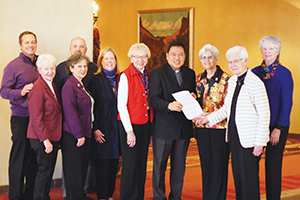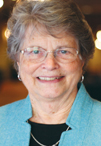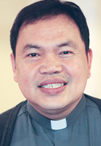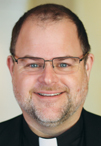By BRIAN REARDON
ALBUQUERQUE, N.M. — In today's challenging environment of lower margins, disruptive competition and public policy whiplash, sponsors of Catholic health care ministries may consider a merger or acquisition as the best path forward to create efficiencies, strengthen operations, serve more patients and advance their mission through scale economics. The largest Catholic health systems in the country — Ascension, Bon Secours Mercy Health, CommonSpirit Health, Providence St. Joseph Health and Trinity Health — have taken this route.

During the CHA Sponsorship Institute, Fr. Elias L. Ayuban, CMF, center, presented a decree from the Vatican Congregation for Institutes of Consecrated Life and Societies of Apostolic Life authorizing the formation of Bon Secours Mercy Ministries. The new ministerial juridic person brings together the sponsor organizations of the Bon Secours Health System and Mercy Health. Those systems merged in September to create Bon Secours Mercy Health. Pictured from left to right: John Starcher, president and chief executive of Bon Secours Mercy Health; Sr. Carol Anne Smith, HM; Thomas Morris; Sr. Mary Elaine Davia, CBS; Colleen Scanlon; Sr. Rose Marie Jasinski, CBS; Ayuban; Sr. Pat Eck, CBS, chair of Bon Secours Mercy Ministries; Sr. Doris Gottemoeller, RSM, vice chair of Bon Secours Mercy Ministries; and Sr. Mary Stanton, RSM. Sr. Smith, Sr. Davia, Scanlon, Sr. Jasinski and Sr. Stanton are members of the juridic person. Morris is chief sponsorship and theology officer for the new health system.
But do such mergers advance the common good? About 100 sponsors, board members and system leaders from across Catholic health care gathered here for two days in early February to explore that question and assess the challenges and opportunities that mergers and acquisitions present to the health care ministry.
"While consolidation is occurring across all industries, for Catholic health care such arrangements require not only strategic clarity but careful discernment. Will a merger advance our commitment to the poor and vulnerable? Will it strengthen our Catholic identity? These are questions that need to be asked," Sr. Mary Haddad, RSM, CHA's vice president, sponsorship and mission services, said as she opened CHA's 2019 Sponsorship Institute.

Wolfe
Regina Wentzel Wolfe, interim vice president and academic dean of the Catholic Theological Union, a graduate school of theology in Chicago, said there is no simple answer to the question of whether mergers will serve the common good. But she believes that is the foundational question that must be addressed when a merger is first considered. Wolfe said it helps to frame the common good question in the context of whether an organization's mission will be advanced as a result of a merger or acquisition.
The process should begin with prayerful discernment, she said. "We need to ask, where is God in all of this? Where is the spirit working?" Sponsorship boards must consider how the merger could impact all stakeholders, both for better and worse, and be sensitive to the plurality of faiths among the various stakeholders.
"Fiscal stewardship and financial due diligence are important but can't be the sole focus when considering whether to merge with another organization. The discernment process must be mission driven, and include moral imagination and adaptive thinking," said Wolfe.
Transformative versus transactional
Wolfe challenged leaders to think about whether framing considerations in terms of how things have been done in the past is adequate for the future.

Woo
"When we activate moral imagination, we reevaluate and move forward in a different way, allowing us to ask, 'will it be transformative or only transactional?'" Wolfe added that adaptive thinking helps identify new stakeholders who should be considered and imagine different approaches to developing partnerships in ways that advance the common good.
Institute participant Carolyn Y. Woo is a member of Ascension Sponsor, the sponsor of Ascension and a past president and chief executive of Catholic Relief Services. She built on Wolfe's comments during a question-and-answer session following a presentation on transforming Catholic health care through strategic clarity.
Woo stressed that transformative mergers in Catholic health care require that leaders be open to partnerships across multiple sectors, such as insurance, information technology and pharmaceuticals in order to identify opportunities that are forward leaning.
She also cautioned that "flight to scale" is sometimes an excuse to avoid tackling problems head-on. For example, she said, "There is a misconception that mergers are the best way to retire excess (bed) capacity. The fact is, health systems can retire capacity without entering into a merger." When mergers do occur, Woo said, it's important to discern what functions and operations in the newly consolidated entity should be customized and which require standardization.
SSM and Agnesian — a case study
In 2015, St. Louis-based SSM Health and Fond du Lac, Wis. -based Agnesian HealthCare began merger discussions. Over the next two years, the two organizations engaged in due diligence and the merger became official on Jan. 1, 2018.

Kaiser
Laura Kaiser, president and chief executive of SSM Health, and Sr. Mary Noel Brown, a member of the Congregation of Sisters of St. Agnes — which was the sponsor of Agnesian HealthCare — shared with institute attendees some of the central lessons they learned from the merger process. Sr. Brown is executive leader of sponsorship for her congregation and she became a member of SSM Health's public juridic person after the merger was finalized.
Kaiser explained that the "essentiality of trust" was critical as SSM and Agnesian leaders began their discussions and that it was important for her personally to learn as much as she could about the Franciscan heritage and rituals of the Agnesian system and congregation.
As they planned for the merger, Kaiser and Sr. Brown emphasized the need for cultural and operational integration. Kaiser said SSM was very deliberate about ensuring they overcommunicated with Agnesian sponsors, board members, leaders and frontline employees, including by acknowledging the sadness they were experiencing in giving up their corporate autonomy. "People love change, but only when the change is their idea," said Kaiser.

Sr. Brown
Sr. Brown acknowledged the loss and apprehension Agnesian's employees felt. But, she said the fact that the two organizations had similar cultures helped ease people's minds about the change that was to occur. "During an employee meeting at St. Agnes about the merger, one of our environmental services colleagues stood up and said, 'For two years I worked at (SSM Health's) St. Mary's in Madison. When I came to work here, all that really changed was the building and the faces of the people around me. What didn't change was the mission and values.' That had a profoundly positive effect on the people in the room," said Sr. Brown.
Larger mergers in Catholic health care since 2013
- Catholic Health Initiatives combined with Dignity Health to form CommonSpirit Health on Jan. 31, 2019.
- Bon Secours Health System combined with Mercy Health to form Bon Secours Mercy Health on Sept. 1, 2018.
- Presence Health joined Ascension, with the definitive agreement announced March 2, 2018.
- Providence Health & Services combined with St. Joseph Health to form Providence St. Joseph Health, effective July 1, 2016.
- Trinity Health and Catholic Health East merged and retained the Trinity Health name, the merger was completed on May 1, 2013.
- Marian Health System merged with Ascension on April 1, 2013.
Church officials advise sponsors to be in regular communication with bishops
ALBUQUERQUE, N.M, — During CHA's 2019 Sponsorship Institute here, Fr. Charles Bouchard, OP, CHA's senior director of theology and sponsorship, engaged church officials in a discussion about how ministerial juridic person members can best keep bishops and Vatican officials abreast of the work of the Catholic health ministries they sponsor.

Fr. Ayuban
A ministerial juridic person is a type of public juridic person that includes laity. The PJP structure is set up under canon law to establish the responsibility of sponsors for a ministry of the Catholic Church.
Panelists Fr. Elias L. Ayuban, CMF, and Fr. Michael Fuller both stressed the importance of MJP members being proactive in scheduling meetings and sharing information with U.S. bishops and with the Vatican. Fr. Ayuban is a canon lawyer who was until recently an official with the dicastery overseeing PJPs, the Vatican Congregation for Institutes of Consecrated Life and Societies of Apostolic Life. Fr. Fuller is executive director of the Secretariat of Doctrine and Canonical Affairs for the United States Conference of Catholic Bishops.

Fr. Fuller
Fr. Fuller said, "Health care is constantly changing, and the bishops have a lot of different issues before them, so they welcome updates from Catholic health care sponsors. While (bishops) may have a long history of interacting with sponsoring congregations in their dioceses, the concept of the public juridic person is still relatively new. There is no course in seminary about PJPs."
Fr. Ayuban, who recently left the dicastery to become the provincial in the Philippines for his Claretian congregation, said the Vatican encourages sponsors to travel to Rome to meet face-to-face with dicastery officials. "It is helpful for us if we receive an agenda and annual report before the meeting. We especially want to see information on formation programs and the work being done to help the most vulnerable."
Thirty MJPs have been established internationally, with 17 of them in the United States. Fr. Fuller believes these MJPs are at the forefront of forming laity. "Since Vatican II, there has been more emphasis on the role of laity in the church. The PJPs being formed can serve as a model for other Catholic institutions, so you have a lot to offer," Fr. Fuller told the sponsors in the audience.
— BRIAN REARDON